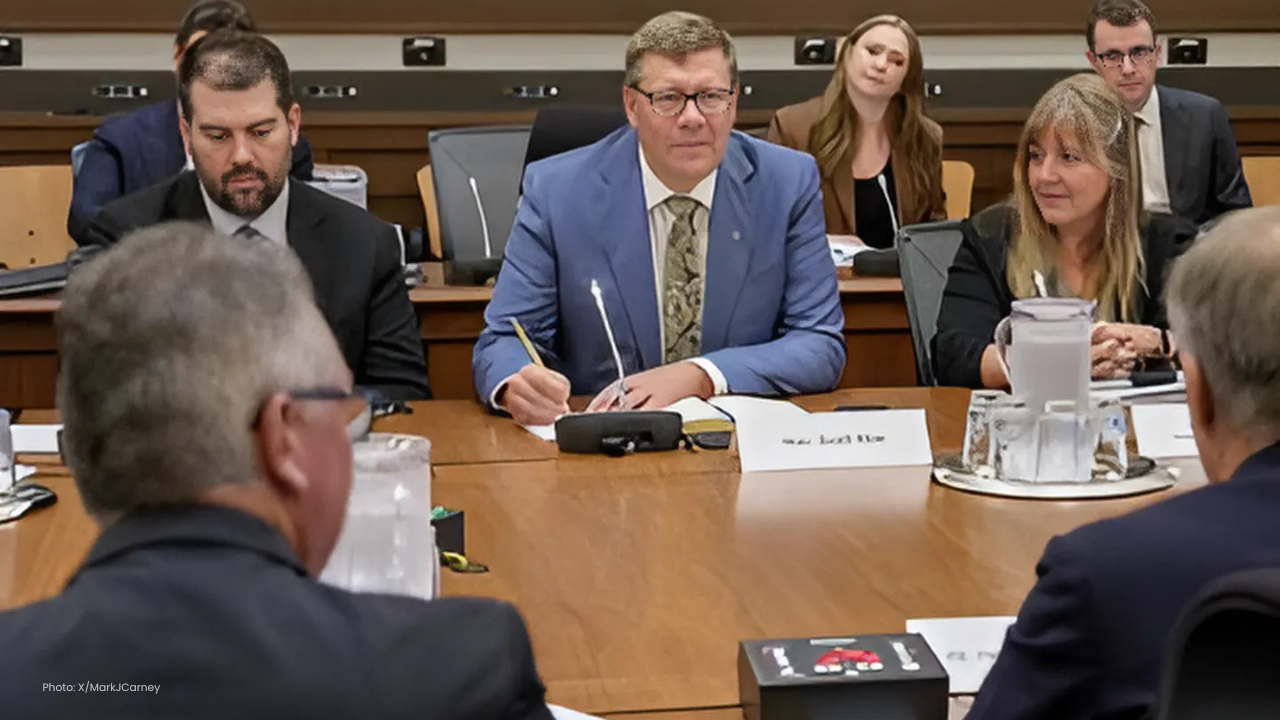
Shawn Clark, UCF Football Coach, Dies at Age 50
Shawn Clark, 50, UCF’s offensive line coach and former Appalachian State head coach, dies after rece

Saskatchewan Premier Scott Moe met with Prime Minister Mark Carney and leaders from Canada’s canola industry in Ottawa on Tuesday. The meeting focused on ongoing trade disputes, particularly China’s tariffs on Canadian canola. Moe called the discussion “good and informative,” emphasizing the importance of international market access for Saskatchewan’s key agricultural exports.
A “Delicate Dance” in Global Trade
Moe described the current situation in global trade as a “sensitive and delicate dance.” Countries around the world are making decisions that can indirectly affect relationships with other nations. “There’s not a lot of confidence in trade certainty moving forward for any country right now,” Moe said. He added that Saskatchewan will work alongside the federal government to ensure Canada’s interests are represented internationally.
China’s Canola Tariffs
China has imposed a 76 per cent tariff on Canadian canola seed, widely seen as a response to Canada’s 100 per cent tariffs on Chinese electric vehicles. In addition to the seed tariffs, Beijing has placed a 100 per cent tariff on Canadian canola oil, meal, and peas. Other Chinese levies target Canadian pork, seafood, steel, and aluminum. These tariffs have put significant pressure on Canadian farmers and exporters, particularly in Saskatchewan, the country’s leading canola-producing province.
Trade Mission to China
Earlier this month, Moe and Parliamentary Secretary Kody Blois visited China to meet with officials overseeing tariffs on Canadian canola. They also met China’s international trade negotiator and other industry representatives to advocate for fair trade and reduced barriers. This recent Ottawa meeting built on those discussions, allowing Canadian leaders to strategize on how to respond and negotiate further.
Ottawa Meeting Details
During the Ottawa meeting, Moe, Carney, and canola industry representatives discussed strategies to improve market access. The discussions were also joined by Minister of Agriculture and Agri-Food Heath MacDonald, Minister of International Trade Maninder Sidhu, Secretary of State for Rural Development Buckley Belanger, and Parliamentary Secretary Kody Blois.
Moe stressed that resolving trade disputes requires careful consideration. “It’s not as simple as dropping tariffs on Chinese electric vehicles,” he said. The aim is to find solutions that benefit all Canadians while maintaining balanced international trade relations.
Prime Minister Carney’s Remarks
Before the meeting, Carney highlighted Moe’s contributions to trade discussions, saying the Premier’s involvement has been “essential to getting us together and moving us forward.” Carney did not speak to reporters after the meeting, but the joint efforts underscore the government’s focus on protecting Canadian farmers and exports.
Importance of Canola to Saskatchewan
Canola is a major agricultural product for Saskatchewan and plays a critical role in Canada’s economy. Tariffs on canola and related products have a direct impact on farmers’ incomes and the ability of the industry to compete internationally. Protecting access to key markets, particularly China, is crucial for the stability of the agricultural sector.
Future Steps and International Strategy
The Ottawa discussions are part of a broader effort to address Canada’s global trade challenges. Carney is set to travel to Mexico on Thursday to strengthen ties with another important trading partner. The visit will include discussions on security, infrastructure, investment, energy, and trade with Mexican President Claudia Sheinbaum.
Meanwhile, Canadian leaders continue to navigate complex negotiations with China. The goal is to ensure fair treatment for Canadian farmers while maintaining diplomatic and economic relationships. Moe emphasized that Canada must act carefully and strategically to avoid worsening trade conflicts.
Industry Reactions
Canola industry leaders welcomed the meeting and expressed hope that Canada’s federal and provincial governments would work together to resolve disputes. Increased communication and collaboration were seen as key to finding practical solutions for farmers impacted by tariffs.
Conclusion
The meeting between Moe, Carney, and canola industry leaders reflects the ongoing challenges Canada faces in international trade. Tariffs imposed by China on Canadian agricultural products, including canola, continue to affect farmers and exporters. By working together, provincial and federal leaders hope to secure fair access to global markets while maintaining strong international relations.